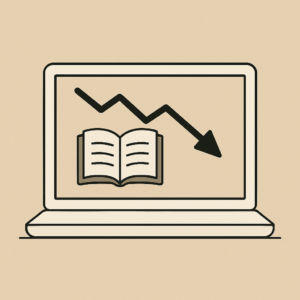Trading in the Zone by Mark Douglas offers a unique understanding of connections between the human psyche and financial markets. In this blog post, we dive into the depths of this masterpiece.
Ever since the advent of stock markets, traders have scoured the globe for strategies to beat the system, inching their way towards a higher return on investment. Among the plethora of financial books, very few delve into the intricate connections between the human psyche and financial markets. Mark Douglas’s “Trading in the Zone” offers this very perspective, illuminating the profound influence psychology holds over trading outcomes.
Douglas breaks down the tenets of trading psychology, emphasizing the importance of mental state and belief systems in the volatile environment of trading. He doesn’t promise foolproof strategies or secret formulas to skyrocket profits, but instead offers an invaluable toolkit to master the emotional whirlwind associated with the markets, setting a robust foundation for informed decision-making.
One might wonder, why the focus on psychology? After all, aren’t the financial markets driven by hard data and factual information? Yes, and no. While the financial markets function on the basis of tangible data, human interpretation of this data, imbued with personal bias and emotion, plays a significant role in market movements. An understanding of this dynamic empowers traders to better navigate the trading environment, thereby improving overall performance.
“Trading in the Zone” is not just for those directly involved in trading but also holds valuable insights for anyone seeking to understand the mechanics of decision-making in uncertain situations. As we delve into the key ideas presented in this seminal work, it’s important to understand that the principles go beyond the stock market, applying to broader life contexts as well.
As we unfold the wisdom in Douglas’s masterpiece, we will explore 18 key ideas with in-depth analysis and practical examples, helping you to understand how this knowledge can be applied to improve your performance in financial markets and beyond. So, fasten your seat belts and get ready for an enlightening journey into the zone!
Key Ideas from Trading in the zone
- Embrace Uncertainty: Uncertainty is a constant in financial markets. Traders often struggle with the unpredictable nature of the markets, which can lead to anxiety and hasty decisions. Douglas encourages embracing uncertainty as a natural part of trading, which can lead to improved decision-making. For instance, a trader who acknowledges uncertainty would be more likely to develop risk management strategies, such as stop losses, to mitigate potential losses.
- Cultivate a Winning Attitude: A winning attitude isn’t about being right all the time. Rather, it involves maintaining confidence and composure, especially in the face of loss. Consider the best traders on Wall Street: they’ve all had losing trades, but their positive attitude keeps them in the game.
- Mental State Matters: Traders often overlook the importance of their mental state on their trading performance. However, stress, fatigue, and anxiety can drastically affect trading decisions. It’s essential to manage one’s mental state, just as one would manage their portfolio. The application? Be disciplined about taking breaks and maintaining a healthy lifestyle outside trading hours.
- Accept Responsibility: Only when traders accept complete responsibility for their actions can they gain true control over their trading. This involves acknowledging that the market isn’t against you—it’s simply reacting to a multitude of factors. For instance, if a trader bought shares that subsequently plummeted, blaming the market or bad luck is unproductive. Accepting responsibility allows the trader to learn from the experience.
- Understand Probability: Understanding the probabilistic nature of financial markets helps traders manage expectations. Each trade represents a single event in a series of outcomes, much like a coin toss. Understanding this can help a trader avoid the trap of overconfidence after a series of successful trades.
- Limit Beliefs and Emotional Interference: Every trader carries a set of personal beliefs into trading, which can sometimes cloud judgement and lead to emotional decisions. Strive to separate personal biases from trading decisions. For example, a trader with a strong belief in a particular company might ignore signs of financial trouble and hold onto stocks longer than advisable.
- Discipline and Consistency: Applying trading strategies consistently and maintaining discipline even in volatile markets can significantly improve trading outcomes. This could mean sticking to your planned entry and exit points, even when the market tempts you to stray.
- Understanding Risk: Douglas emphasizes the significance of understanding and accepting the risk associated with each trade. This acceptance alleviates fear and allows for clear-headed decisions. For example, never risk more than you are willing to lose and always have a clear understanding of your potential downside.
- Objectivity: To trade successfully, one must learn to observe the market objectively, free from the distortions of fear and hope. A trader should, for instance, refrain from projecting their hopes on an uptick in a falling market without substantial supporting evidence.
- Building a Belief System: Traders must create a robust belief system based on market understanding and personal experience. This belief system forms the basis for trading decisions and helps maintain consistency. For instance, a trader might believe in investing only in companies with strong environmental, social, and governance (ESG) practices.
- Edge Definition: Every trader needs an edge—a method that gives them a higher probability of winning over losing. The edge could be a unique analytical tool, like Central Pivot Range (CPR), or a specific understanding of market trends. It’s essential to define, trust, and consistently apply this edge in trading.
- Perception of Information: Perception of market information is subjective, and recognizing this subjectivity is crucial for trading. Two traders might interpret the same piece of news differently based on their biases and belief systems, leading to different trading decisions.
- Overcoming Fear: Fear is a dominant emotion in trading that can lead to irrational decisions. Douglas emphasizes the need to overcome this fear by accepting the risks involved in trading and trusting one’s system. For example, a trader might fear entering a trade after a series of losses but overcoming this fear and trusting the process is key to long-term success.
- Five Fundamental Truths: Douglas introduces five fundamental truths to assist traders in accepting the inherent uncertainties of the market: Anything can happen; you don’t need to know what will happen next to make money; there is a random distribution between wins and losses; an edge is nothing more than an indication of a higher probability of one thing happening over another; every moment in the market is unique.
- Four Primary Trading Fears: Douglas defines the four primary trading fears: Fear of being wrong, fear of losing money, fear of missing out, and fear of leaving money on the table. Recognizing and addressing these fears can greatly improve trading psychology.
- Creating a Mental Framework: Traders must build a mental framework to interpret market information. This involves constructing a coherent belief system that aligns with their individual risk tolerance, goals, and trading style.
- Developing Self-Trust: Building self-trust is crucial in trading. It involves trusting one’s ability to execute trades based on their system, regardless of market fluctuations. For instance, a trader must trust their decision to sell a particular stock when their system indicates, even if the market seems bullish.
- Continuous Learning: Trading is a continuous learning process. Market conditions change, new tools emerge, and personal circumstances evolve. Staying open to learning and adapting one’s system accordingly is essential for consistent success in trading.
Mark Douglas’s “Trading in the Zone” is an extraordinary guide that takes you beyond traditional trading strategies, into the realm of psychological resilience and mental mastery. It provides a fresh perspective on trading, emphasizing the importance of individual belief systems, discipline, and emotional control in decision-making. The financial markets are indeed a battlefield of numbers, but Douglas illustrates that the most intense battles often occur within the trader’s mind.
Douglas’s teachings go beyond the confines of the stock market; they apply to all areas of life involving risk and uncertainty. By acknowledging the role of personal psychology in decision-making, we not only become better traders but also gain insight into managing risk and uncertainty in various life situations.
As we conclude this exploration of “Trading in the Zone,” remember that the path to becoming a successful trader is not a straight line but a continuous journey of self-improvement and learning. Trading, at its core, is a journey within. It’s about knowing oneself, accepting the unknown, trusting the process, and most importantly, consistently applying your own unique edge in the markets. The zone, as Douglas puts it, is not a place, but a state of mind. So, equip yourself with these powerful insights and make your way into the zone, in trading and beyond!
Did you know? Traders like to use our coworking space in Bangalore
Learn more about our coworking space on our YouTube channel Work Theater Studios where we talk about a variety of topics including personal finance, entrepreneurship, business and life.
Did you know? We also have a private theatre in Bangalore.




